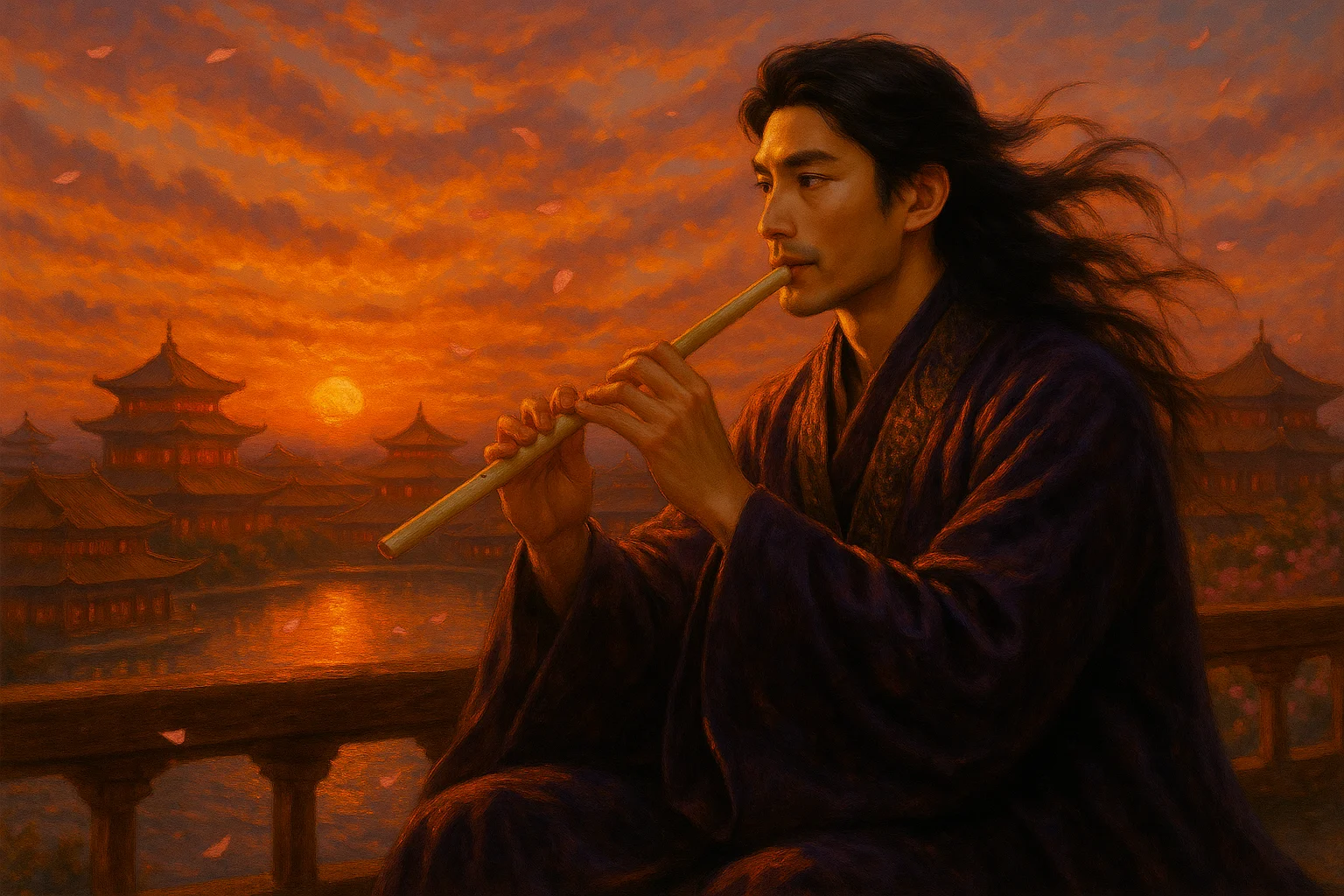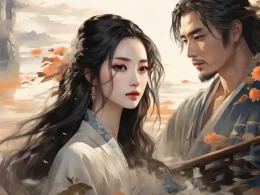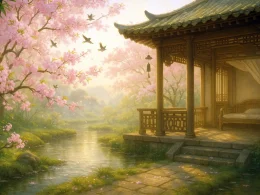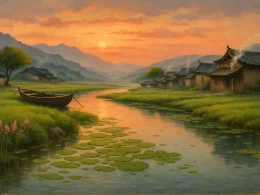Snow veils mume blooms, mist clings to willow boughs,
Spring’s first whispers stir the air.
Wild geese depart, orioles yet unseen—
Emerald pools ripple without a care.
We pluck flowers, keep guests drunk with wine,
Reliving last year’s tender cheer.
Golden cups brim, incense curls from jade,
While the crimson sun lingers, slow and dear.
Original Poem
「更漏子 · 雪藏梅」
雪藏梅,烟著柳。
依约上春时候。
初送雁,欲闻莺。
绿池波浪生。探花开,留客醉。
晏殊
忆得去年情味。
金盏酒,玉炉香。
任他红日长。
Interpretation
Yan Shu, known for his gentle refinement, crafted lyrics distinguished by their elegant grace, particularly excelling in depicting spring scenes, banquet outings, and the sorrows of parting. This poem likely originated from a tranquil period in his official career, capturing the moment when early spring's first blossoms stir hidden emotions. Blending scene with sentiment and investing objects with feeling, it reveals—amid the gradually warming spring light—a lingering nostalgia for bygone beauty, its exquisite tenderness resonating long after reading.
First Stanza: "雪藏梅,烟著柳。依约上春时候。初送雁,欲闻莺。绿池波浪生。"
Xuě cáng méi, yān zhuó liǔ. Yīyuē shàng chūn shíhòu. Chū sòng yàn, yù wén yīng. Lǜ chí bōlàng shēng.
Snow still veils the plum blossoms, / Mist tints the willow strands— / Spring's arrival hinted at the edges. / The last wild geese depart northward, / Orioles not yet singing— / While emerald pools ripple with newborn waves.
Through "plum," "willow," "wild geese," "orioles," and "emerald pools," the stanza paints nature's reawakening at winter's twilight. "Snow-veiled plums" retain winter's chill, while "mist-tinted willows" whisper spring's approach—this liminal moment between seasons embodies restrained beauty and time's quiet passage, showcasing Yan Shu's signature delicate touch.
Second Stanza: "探花开,留客醉。忆得去年情味。金盏酒,玉炉香。任他红日长。"
Tàn huā kāi, liú kè zuì. Yì dé qùnián qíngwèi. Jīn zhǎn jiǔ, yù lú xiāng. Rèn tā hóng rì cháng.
We pluck newly opened flowers, / Guests linger in wine's embrace— / Remembering last spring's identical joy. / Golden cups of wine, / Jade censers' fragrance… / Let the lengthening daylight stretch as it will.
Shifting to human activity, the stanza presents either witnessed or remembered banquets. "Flower-gathering" and "guests' lingering intoxication" blend present pleasure with tender recollection. The line "remembering last spring's joy" crystallizes the poet's emotional core, echoing the poem's pursuit of seasonal nostalgia. "Golden wine cups" and "jade censers" conjure an atmosphere of cultured warmth, while the closing line—"let the daylight stretch"—reveals serene acceptance, as if saying: with such beauty before us, why not let time unfold at its own pace?
Holistic Appreciation
Yan Shu's lyric poem is meticulously crafted, painting a scene of pristine beauty. The first stanza captures the anticipation of spring's arrival—plum blossoms yet to bloom, willows just hinting at green, migratory birds traversing between north and south—as nature stirs without full awakening, embodying the sentiment that "spring is already complete on the branch-tips." Through vivid imagery, it conveys the subtle heralding of spring and the promise of a beautiful season to come.
The second stanza shifts unexpectedly, using a flower-viewing banquet to evoke memories, where "last year's sentiments" stir tender recollections in the poet's heart. Though the characters are not directly depicted, motifs like "keeping guests lingering in drunkenness," "golden cups of wine," and "jade-incense burners" portray an elegant yet warm conviviality. The closing line, "Let the red sun stretch long," carries no sorrow or parting but faintly reveals a serene acceptance of time's passage—a hallmark of Yan Shu's characteristically "gentle and dignified" aesthetic.
The poem's refined language and precise structure demonstrate his mastery of weaving emotion into objects and drawing feeling from scenery, flowing naturally with lingering resonance. It exemplifies Yan Shu's profound artistry within the graceful, restrained lyric tradition.
Artistic Merits
- Scene and Emotion Intertwined, Subtle Ambience: The chosen imagery—"snow-cloaked plums," "mist-laden willows," "green-pooled ripples"—is richly pictorial, capturing "spring's imminent arrival" while deftly conveying inner sentiment.
- Layered Sentiment, Organic Structure: Transitioning from scene to emotion, memory to present, the poem flows seamlessly, its structure effortless and cohesive, allowing the mood to shift without disruption.
- Simple Words, Profound Feeling: Though the diction is plain, the emotions run deep, moving the heart through quiet restraint—a concentrated expression of Yan Shu's graceful, understated style.
Insights
This exquisite meditation on early spring avoids dramatic highs and lows of joy and sorrow, yet within seasonal transitions, it voices philosophical reflections on life's fleetingness and the preciousness of youth. Through sensitive observations of nature, the poet awakens appreciation for life's beauty and emotional memories. It reminds us: though spring will come in time, and the past may be recalled, the present moment is most worthy of cherishing. Faced with spring's budding vitality and time's ceaseless flow, perhaps the finest state of mind is embodied in that serene acceptance: "Let the red sun stretch long."
About the Poet

Yan Shu (晏殊 991 – 1055) Originaire de Fuzhou dans le Jiangxi, Yan Shu fut le maître fondateur de l'école wanyue (élégante et retenue) de la poésie ci sous les Song du Nord. Enfant prodige entré dans l'administration à quatorze ans, ses ci allient noblesse classique et méditation philosophique dissimulée sous des évocations de prospérité raffinée. Mentor de talents comme Fan Zhongyan et Ouyang Xiu, il initia l'École du Jiangxi en poésie ci et posa les bases de l'épuration du genre sous les Song.












